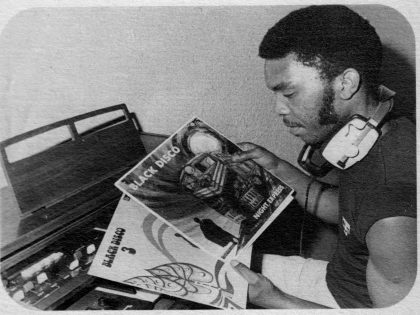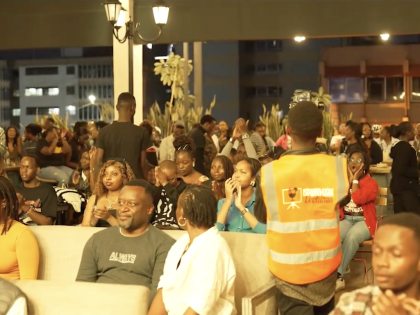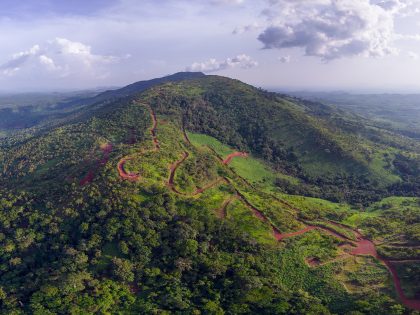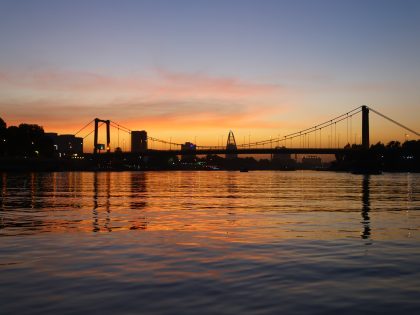The Trump Card
Denis Sassou Nguesso's embarrassing attempt to ingratiate himself to Donald Trump.

Denis Sassou Nguesso, President of the Republic of the Congo, speaks at the UN in 2009. Image Credit: UN Photo, via Flickr CC.
On December 26, 2016, President Denis Sassou Nguesso left Brazzaville, the capital of the Republic of Congo, for Miami, Florida, accompanied by his foreign minister and a team of aides. In power since 1979 for all but five years, Sassou Nguesso has acquired a reputation for gross corruption and equally gross human rights abuses. Despite these credentials, he was reportedly scheduled to meet US President-Elect Donald Trump at a charity dinner on the evening of December 27.
Sassou Nguesso publicized the meeting widely. Thierry Moungalla, his Communications Minister, announced it on Twitter on December 26, along with a memo signed by Firmin Ayessa, Sassou Nguesso’s longtime aide. The meeting was announced on Sassou Nguesso’s official website; in Les Dépêches de Brazzaville, his propaganda newspaper; and on Télé-Congo, the state-run television station, which even published a doctored photograph of Trump and Sassou Nguesso embracing, with the latter standing slightly taller. Trump’s necktie ultimately belied the photograph’s origins. It was taken after a meeting between Trump and Mitt Romney, with Sassou Nguesso now in Romney’s stead.
News of the meeting – which would have been Trump’s first with an African head of state since his election – went viral on social media. Apparently embarrassed, Trump’s spokeswoman, Hope Hicks, denied it had ever been scheduled. Details of the meeting remain hazy. It is unclear who issued Sassou Nguesso’s invitation, what was to be discussed, and in what context the meeting would occur. What is clear, however, is that the meeting was to occur at the charity dinner in Palm Beach, Florida, and possibly at Trump’s Mar-a-Lago resort.
The meeting, according to the Congolese government, would ostensibly focus on the humanitarian crisis in Libya. Sassou Nguesso’s real agenda had four points. First, Sassou Nguesso and other African autocrats perceived NATO’s intervention in Libya as a threat. If, following the Arab Spring, western governments proved willing to intervene on behalf of democracy activists, Africa’s autocrats would lose the ability to employ violence against citizens. This threat was particularly acute after the Burkinabé Revolution of 2014, which forced President Blaise Compaoré from power after 27 years and emboldened activists across the region. “African problems,” Sassou Nguesso planned to tell Trump, “require African solutions.” The principle is eminently reasonable, almost indisputable. For Sassou Nguesso and other autocrats, however, it is a license for repression.
Second, Sassou Nguesso is enmeshed in corruption scandals in Australia, France, Italy, Portugal, Spain, and Switzerland. Earlier this year, during trips to Washington, Sassou Nguesso’s wife, son, and finance minister were served with subpoenas, which require them to disclose the sources and locations of Sassou Nguesso’s wealth. The subpoenas were delivered as part of Commisimpex SA’s effort to collect a $1 billion arbitration award, which stemmed from Sassou Nguesso’s refusal to pay infrastructure invoices some 30 years ago. Sassou Nguesso routinely uses official meetings with French presidents to elicit guarantees of immunity from prosecution. He is seeking similar assurances from Trump.
Third, Sassou Nguesso has long had a strained relationship with ExxonMobil, and its CEO Rex Tillerson, who was recently named Trump’s nominee as secretary of state. The strained relationship dates from the late 1980s, when ExxonMobil played a central role in offshore exploration. According to Elie Smith, a leading journalist in Central Africa, Sassou Nguesso awarded French corporations Elf and Total the most lucrative production permits – essentially snubbing Exon Mobil. Given Sassou Nguesso’s protracted centrality in FrançAfrique corruption networks, his decision was no surprise. Still, he is keen to repair his relationship with Tillerson.
Finally, the meeting underscores how Africa’s autocrats seek foreign cover for domestic troubles. Sassou Nguesso routinely leads mediation efforts across francophone Africa: in Cote d’Ivoire in 2006, in the Central African Republic in 2015, and in Libya since 2011. In 2006, his efforts helped secure an Oval Office meeting with then president George W. Bush, during which Sassou Nguesso pressed for relief from a debt crisis caused by his own mismanagement. In 2015, Sassou Nguesso sought French President Francois Hollande’s implicit approval for a constitutional revision, which enabled him to stand for “reelection” in March 2016. Now, Sassou Nguesso seeks cover for his ongoing military campaign in the Pool region, which ostensibly targets a rebel group that no longer exists. In reality, the campaign is designed to threaten citizens who might otherwise protest his fraudulent “reelection.”
As Sassou Nguesso waited for the meeting in Palm Beach, his aides attempted to mitigate his humiliation. His Foreign Minister, Jean-Claude Gakosso, attributed the delay to “diplomatic time.” Thierry Moungalla admonished the Congolese press to “be patient.” But he was excoriated in the African press, on social media, and at home. One Ouagadougou newspaper, Le Pays, mocked his presumption: “What does he think he can teach the new American president about Libya?” One commentator suggested that Sassou Nguesso “should stage a sit-in at Trump Tower.” Paul Marie Mpouélé, a Brazzaville activist, called the episode “a national shame.”
The domestic repercussions have already begun. As his military campaign in the Pool region makes clear, Sassou Nguesso routinely employs violence against civilians to preempt dissent. Fearing that the Trump debacle could provide a focal point for frustrated citizens to protest, Sassou Nguesso again threatened repression. On December 29, the regime’s security services opened fire at a Brazzaville prison, where Paulin Makaya, a leading democracy activist, is incarcerated. At least three were killed and several arrested. Expect more repression in the short-term.
Some expect the charade in Miami to further strain relations with Washington. It will not. Many of Africa’s autocrats welcomed Trump’s election. Burundi’s Pierre Nkurunziza congratulated Trump minutes after his election, as did Rwanda’s Paul Kagame and Uganda’s Yoweri Museveni. “Your victory,” Nkurunziza declared, “is the victory of all Americans.” Sassou Nguesso welcomed Trump as a “pragmatist.” They believe Trump will prioritize America’s economic interests over its democratic ideals. Sassou Nguesso’s personal affection for Trump might be diminished after the Miami incident, but this will in no way dent his enthusiasm for a Trump presidency.



















